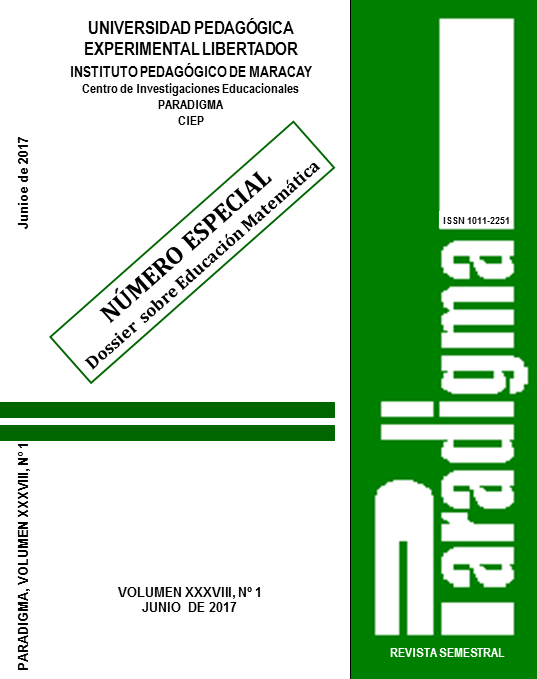VINCULACIÓN DE LAS MATEMÁTICAS CON LA REALIDAD. IMPLICACIONES EN LA CONFORMACIÓN DEL PENSAMIENTO PROFESIONAL DEL DOCENTE
DOI:
10.37618/PARADIGMA.1011-2251.2017.p288-311.id611Abstract
Existe una fuerte demanda social, académica e institucional para que las matemáticas escolares se vinculen con la realidad. Al atender este tipo de demandas encontramos que existen otras maneras y conocimientos matemáticos diferentes a los que tienen presencia en la cultura escolar, y son utilizados en diferentes situaciones de vida. Nos referimos a las matemáticas no institucionalizadas de tipo cotidiano y funcional; ellas tienen lugar en diferentes realidades y la institución escolar las ignora. Nos preguntamos entonces si los modelos que describen el pensamiento del profesor de matemáticas consideran estos tipos de conocimientos matemáticos no institucionalizados y hallamos que no. Ante estas limitaciones proponemos replantear estos modelos, lo que llevaría a asumir una ruptura epistemológica en relación a lo que entendemos como matemática y a la manera como concebimos al estudiante y su manera de aprender.Palabras claves: Matemática y realidad, Conocimiento del profesor, Tipos de conocimiento matemáticosAbstractThere is a strong social, academic and institutional demand for school mathematics for linking with reality. In addressing these claims find that there are other ways and math skills different from those that have a presence in the school culture and are used in different situations of life. We refer to mathematics no- institutionalized (daily and functional type); they take place in different realities and the school system ignores them. We wondered then if the models describing the thought math teacher consider these types of non-institutionalized mathematical knowledge and found no. Given these limitations suggest rethink these models, leading to assume an epistemological break in relation to what we understand as mathematics and the way we think the student and their way of learning.Keywords: Mathematics and reality, Knowledge teacher, Types of knowledge of mathematicsDownloads
Download data is not yet available.
Downloads
Published
2017-06-26
Métricas
Visualizações do artigo: 148 PDF (Español (España)) downloads: 127
How to Cite
Parra Sandoval (LUZ-Venezuela), H., & Villa-Ochoa (UDEA-Colombia), J. A. (2017). VINCULACIÓN DE LAS MATEMÁTICAS CON LA REALIDAD. IMPLICACIONES EN LA CONFORMACIÓN DEL PENSAMIENTO PROFESIONAL DEL DOCENTE. PARADIGMA, 38(1), 288–311. https://doi.org/10.37618/PARADIGMA.1011-2251.2017.p288-311.id611
Issue
Section
Dossier de Educación Matemática


 English
English
 Español (España)
Español (España)
 Français (France)
Français (France)
 Português (Brasil)
Português (Brasil)




















































